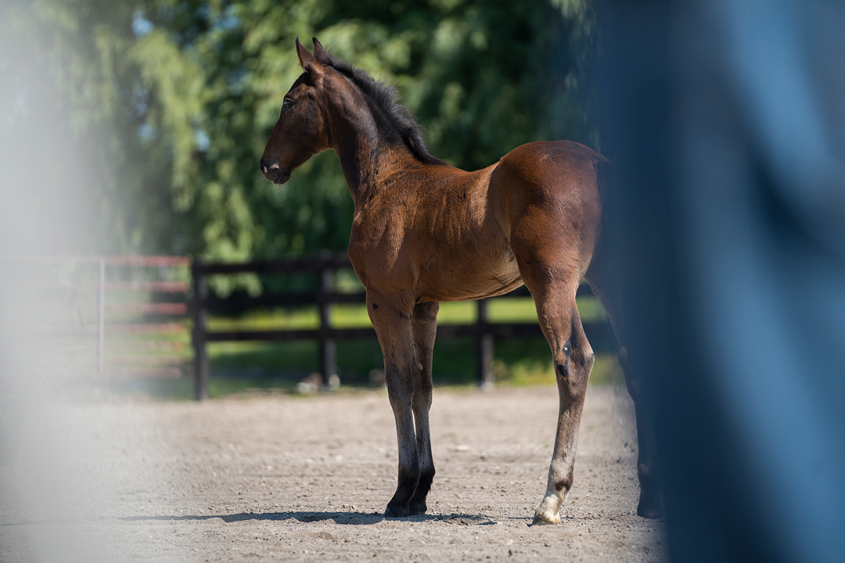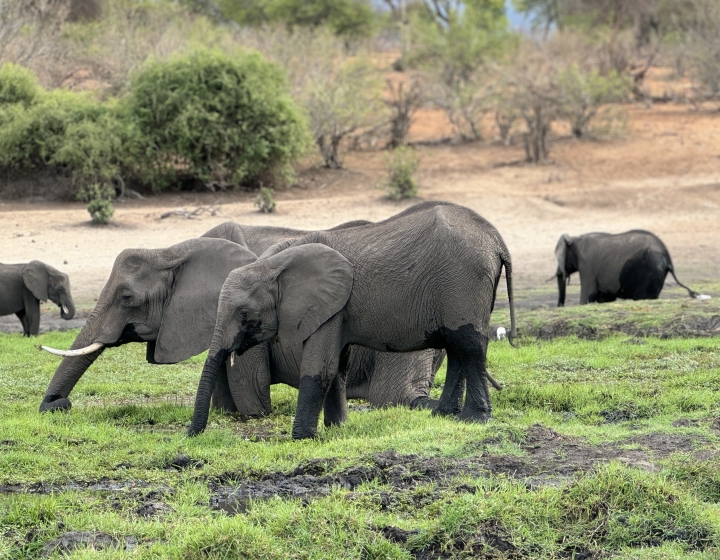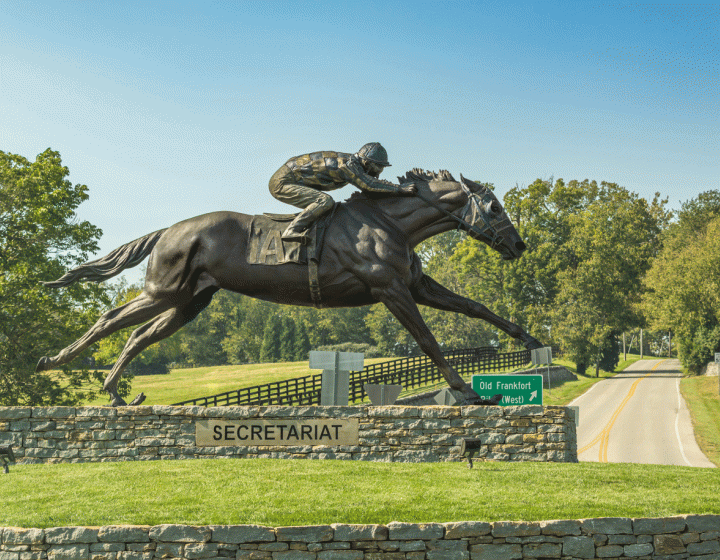Cornell colt graduates from equine park, heads to new home
Seabright, a colt born at the Cornell Equine Park, departed for his new home in Wisconsin last month after over a year of planning and care from veterinarians, staff and students at the College of Veterinary Medicine. “Everyone who saw him gave him pats and scratches and brought visitors to meet him since he was so sociable and cute,” said Sarah Ruby, veterinary assistant in the theriogenology service, which specializes in breeding and reproduction.
Multiple services worked to shepherd Seabright into the world. Students, residents and clinicians in the theriogenology service are involved in the birth and his first few hours, and then daily physical exams to address any early issues. Staff at the Cornell Equine Park kept Seabright and his mother clean, well-fed and exercised. The ambulatory service gave routine vaccinations and deworming for both mom and baby, while the Cornell farrier examined him every few weeks.
In short, it takes a village, and in this case, the children – AKA Seabright – are also teachers to students who might not be familiar with the delivery and raising of foals.
Seabright has impressive parents in Amazing Grace Q, a 2003 Hanoverian mare, and Seacoast Wonderful, a 1999 bay Belgian warmblood stallion. With this parentage, Seabright is poised to become a talented jumper. The equine park breeding program has produced many foals in its 20-year history, many of which have become successful hunters, jumpers and dressage horses.

The park’s impressive roster of sport horses is thanks in part to the strategic matchmaking expertise of veterinarians in the theriogenology service. “Sarah Ruby and our team look at the bloodlines of the mares and stallions, and decide what will be the best cross of bloodline, temperament and potential athletic ability,” said Dr. Mariana Diel de Amorim, lecturer in the Department of Clinical Sciences.
Theriogenology provides reproductive medicine services, including breeding management, assisted reproductive techniques, semen freezing and supervision of high-risk pregnancies and foaling, as well as medical and surgical treatment for conditions related to the reproductive system.
The Cornell Equine Park itself contains 165 acres of pasture, a 62-stall main barn, as well as stallion and broodmare barns. The entire facility is a learning lab for veterinary students and researchers, who study the equine residents of the park, some of whom were donated to the college after injuries in their previous careers.
“The Cornell Equine Park is beautiful, and we are excited to have secured funding to build new barns and to renovate existing facilities to provide state-of-the-art care for all of our teaching and client horses,” said park director and James Law Professor of Large Animal Surgery Lisa Fortier, Ph.D. ’98. “Our excellent staff and faculty give a unique opportunity for students to breed, manage and foal pregnant mares. We are also aiming to expand our care for horses in rehabilitation programs at the equine park.”

Each horse helps students learn to examine and diagnose equine patients. Students on their theriogenology rotation, for example, learn how to manage the mares for breeding, collect and evaluate sperm, inseminate the mare and other key clinical skills for equine medicine.
“Having this park available for educational purposes is one reason why the Cornell veterinary college provides such a wonderful and thorough foundational veterinary education,” said Diana Perdomo Tornbaum, a fourth-year veterinary student.
“Students play an active role in making the foal from start to finish. They get very excited about these opportunities since they rarely experience a mare’s foaling, as the majority of them foal in the middle of the night,” said Diel de Amorim. “They also take care of the foals with neonatal checks, physical exams, handling the foals and treating them medically if necessary.”
“On my rotation, we had five foalings - an unusually large amount for one rotation,” said Tornbaum, “so I definitely saw the variety in the early signs of impending birth.”
A horse with charisma
The average length of an equine pregnancy is approximately 11 months long, and staff at the Cornell Equine Park work to ensure mares like Amazing Grace Q are happy and healthy the whole time. “She is a professional mom,” said Ruby, “attentive but not overprotective, and great for students to work with.”

“Amazing Grace Q’s foal has the most wonderful temperament, just like hers, and this was very helpful when working with them,” said Diel de Amorim, who noted how Seabright took after his mother in size as well. A larger foal poses a challenge to students to make sure parturition and handling go smoothly, but Diel de Amorim said the good nature of both horses facilitated this.
The park owns 43 mares and four stallions, and hosts client-owned horses that can receive stud and other reproductive services. With all the work that goes into the daily care of the horses at the park, faculty and staff build strong bonds with each animal.

“We built a relationship with Seabright through his physical exams and daily handling,” said Ruby, who visits all the foals regularly to get a sense of their personality for potential buyers.
“Seabright was a very lively colt when I met him, and I am sure he is going to make a wonderful equine companion in the future,” said Tornbaum.
Seabright’s charisma was apparent from the start, rambunctious even as a newborn. His personality and good breeding earned him a ‘premium foal’ grade at his German Oldenburg Horse Breeders Society inspection, indicating a promising career. The society is one of the foremost horse breeding groups in the world. Representatives come to the park each year to evaluate the latest crop of foals for registration and breed requirements.
“When we breed horses, they’re high-quality foals with a full and useful future ahead of them. We make it our mission to uphold that standard,” said Fortier. “In the process, the horses receive the best care and our students gain important experience regardless of their future specialties. I can’t emphasize enough how important these horses are as teachers.”
When the time came for Seabright to travel to owners Katherine and Todd Elliot in Wisconsin, the community came out to say goodbye and wish him luck at his new home.







